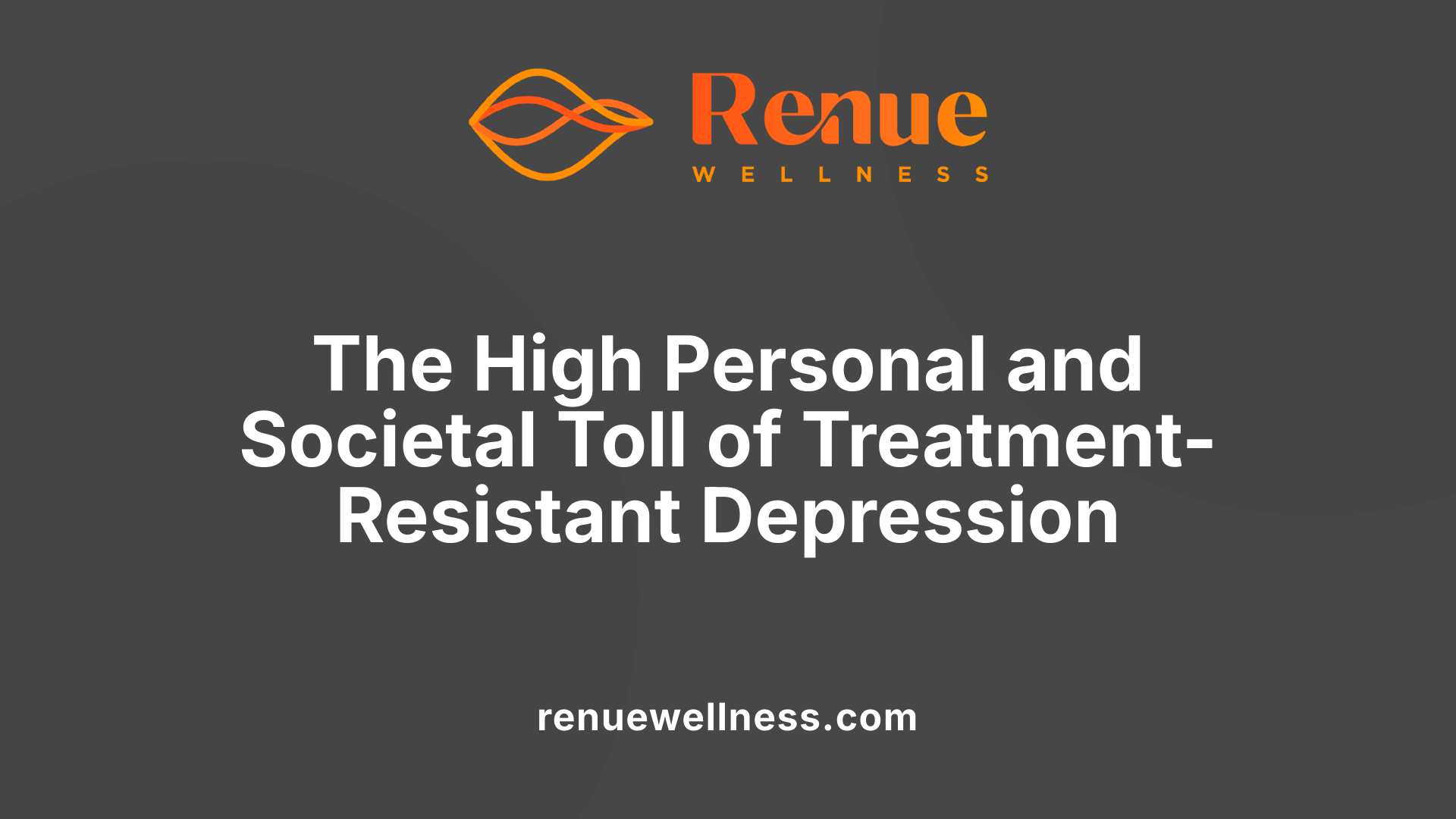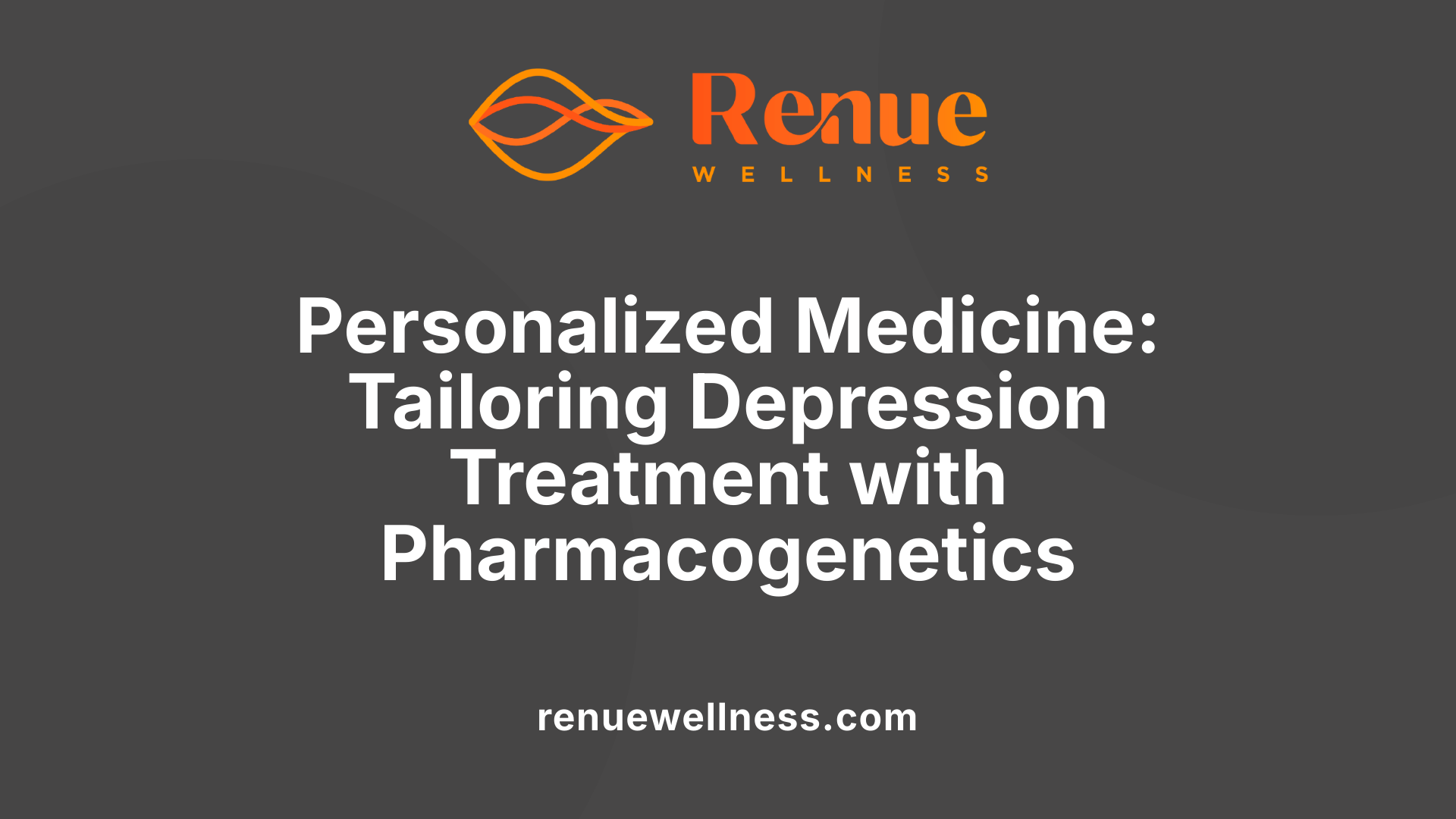Why Traditional Medications Often Fail People With Depression


August 15, 2025
Understanding Why Many Patients Do Not Respond to Standard Depression Treatments
While antidepressant medications have long been the frontline treatment for major depression, a significant portion of patients—ranging from 30% to more than 50%—do not achieve relief from their symptoms. This phenomenon, known as treatment-resistant depression (TRD), underscores the limitations of conventional pharmacotherapy. This article explores the reasons behind these failures, the biological and environmental factors involved, and emerging innovative treatments that offer hope beyond traditional medications.
Factors Leading to Inefficacy of Traditional Antidepressants

Why might traditional antidepressants be ineffective for some individuals?
Many patients with depression do not find relief from standard medications, and understanding why is crucial for improving treatment outcomes.
Individual differences in brain chemistry play a significant role. Neurochemical imbalances involving serotonin, norepinephrine, and dopamine are targeted by antidepressants, but the complexity of these systems means that alterations may not be uniform across all individuals. Some patients have neurobiological profiles that respond poorly to medications designed to modify these neurotransmitter levels.
Genetics also influence treatment response. Pharmacogenetic studies suggest that genetic predispositions can affect how drugs are metabolized or how receptors function, making some patients less responsive to common antidepressants. Although the contribution of genetics to depression onset is relatively low (~16%), it can significantly impact medication efficacy.
Co-occurring medical and psychiatric conditions further complicate treatment. Conditions such as thyroid disorders, heart disease, anxiety, PTSD, or substance use disorder often interfere with medication effectiveness or may require different treatment strategies. These comorbidities can alter brain function or worsen depression symptoms, leading to poor responses.
External influences, including stress levels, lifestyle habits, and environmental factors, also affect treatment outcomes. Chronic stress can modify hormonal responses, like cortisol levels, impairing medication efficacy. Lifestyle factors like poor sleep, substance use, and lack of physical activity can exacerbate symptoms and hinder recovery.
Medication interactions pose another challenge. Some prescribed drugs, over-the-counter products, recreational substances, and supplements can interfere with antidepressant action or cause side effects that complicate treatment.
Finally, some patients experience breakthrough depression, where symptoms persist or recur despite long-term treatment. This condition often necessitates adjusting medication types or doses, adding psychotherapy, or exploring alternative therapies.
In summary, the inefficacy of traditional antidepressants involves a complex interplay of biological, psychological, and environmental factors. Recognizing this complexity underscores the importance of personalized treatment plans that may include newer pharmacological options, neuromodulation techniques, or comprehensive lifestyle changes.
More information: Mechanisms and hypotheses explaining medication failure in depression
Complex Biological Underpinnings of Treatment Resistance

What factors contribute to treatment-resistant depression?
Treatment-resistant depression (TRD) involves various biological and non-biological factors that hinder optimal response to standard treatments. One significant aspect is neurochemical alterations that cause delays in medication response. Traditional antidepressants mainly target monoamines like serotonin, norepinephrine, and dopamine. However, ongoing neuroplasticity deficits and neuroinflammation can interfere with the desired cellular adaptations, resulting in delayed or diminished effects.
Brain inflammation has emerged as a critical player in TRD. Increased levels of cytokines and other inflammatory markers can disrupt normal neural signaling, impairing mood regulation pathways. Additionally, neuroplasticity deficits, such as reduced synaptic connectivity and neurogenesis, further complicate treatment outcomes. These structural and functional brain changes diminish the brain’s ability to recover from depressive episodes.
Genetics and biomarkers offer promising avenues for understanding individual treatment responses. Variations in genes like BDNF Val66Met influence neuroplasticity and responsiveness to treatments such as ketamine. Pharmacogenetic testing is increasingly used to identify these genetic markers, potentially guiding personalized therapy choices.
Structural brain alterations are also associated with TRD. Reduced volume in key areas like the prefrontal cortex and hippocampus has been documented in patients with resistant depression. These changes can affect neural circuitry involved in mood regulation, making the disorder less responsive to conventional pharmacotherapy.
Overall, the complex biological landscape of TRD underscores the need for tailored treatment strategies that address neuroinflammation, neuroplasticity, and structural brain integrity. Emerging research targeting these mechanisms holds promise for improving management outcomes and developing more effective therapies.
Prevalence and Impact of Treatment-Resistant Depression

What is the impact and prevalence of treatment-resistant depression?
Treatment-resistant depression (TRD) is a significant challenge within mental health, affecting a sizable fraction of individuals diagnosed with major depressive disorder (MDD). Studies estimate that about 30% to over half of depression patients do not respond adequately to standard antidepressant treatments, such as SSRIs or SNRIs. Globally, this translates to more than 100 million people facing persistent depressive symptoms despite multiple treatment attempts.
The prevalence of TRD varies widely across different settings and populations, with rates reported to range from about 6% up to more than 55%. Such variation is mainly due to differing diagnostic criteria, the number of treatment trials considered adequate, and population-specific factors.
TRD is often characterized by prolonged illness, with symptoms persisting for months or years. It is frequently accompanied by psychiatric comorbidities such as anxiety disorders, personality disorders, and substance use issues. Physically, many patients also experience coexisting conditions like cardiovascular disease or chronic pain.
The clinical features of TRD include severe functional impairment, with many affected individuals struggling with daily activities, employment, and social relationships. This level of illness burden leads to frequent healthcare utilization, including multiple medication trials, psychotherapy, and sometimes invasive procedures like electroconvulsive therapy (ECT) or neuromodulation.
Economically, TRD imposes a heavy financial toll, both on healthcare systems and on individuals. The costs stem from prolonged treatment courses, hospitalizations, loss of productivity, and social support needs.
Overall, the high prevalence and profound impact of TRD underscore the urgent need for innovative therapies, including neuromodulation techniques like Transcranial Magnetic Stimulation (TMS) and novel pharmacological agents. Improving treatment strategies could reduce the significant personal, societal, and economic burdens associated with this form of depression.
Emerging Therapeutic Approaches and Alternatives
What are alternative and innovative treatment options for depression beyond conventional medications?
Traditional antidepressants, though effective for many, do not work for everyone. For those with treatment-resistant depression, innovative and alternative therapies are essential. These include advanced neuromodulation techniques, rapid-acting pharmacological agents, and supportive psychotherapies combined with lifestyle interventions.
One of the most promising developments is the use of neuromodulation techniques. Transcranial Magnetic Stimulation (TMS), especially in its refined protocols like the Stanford Neuromodulation Therapy (SNT) and fMRI-guided interventions, has shown response rates of around 86%, with significant remission outcomes. TMS involves magnetic pulses targeting the prefrontal cortex, boosting neural activity associated with mood regulation, and tends to have fewer side effects compared to medication.
Similarly, Electroconvulsive Therapy remains a highly effective option, particularly for severe or resistant cases. ECT induces controlled seizures under anesthesia, leading to symptom improvement in approximately 80% of patients. Although cognitive side effects are a consideration, modern techniques have improved its safety profile.
Rapid-acting agents such as ketamine and esketamine have revolutionized the treatment landscape by providing quick relief of depressive symptoms, especially in suicidal ideation. Administered via infusion or nasal spray, these drugs act on glutamate receptors, helping rebuild neural connections. While their short-term efficacy is well-established, ongoing research is focused on understanding long-term safety and optimal treatment protocols.
In addition to these, novel pharmacological targets are being explored. Medications affecting glutamate receptors, neurotrophic factors, and inflammatory pathways are under clinical investigation. These emerging drugs aim to address the complex neurobiology of depression more directly.
Complementary approaches like psychotherapy—including cognitive-behavioral therapy and mindfulness-based interventions—play a crucial role, especially when integrated with medical treatments. Lifestyle interventions such as exercise, a balanced diet, sleep hygiene, and arts therapies can further support recovery.
Emerging modalities like vagus nerve stimulation (VNS) and transcranial direct current stimulation (tDCS) are also gaining attention as adjuncts or alternatives, offering personalized treatment options for complex cases.
In summary, the future of depression treatment is moving toward a more integrated, personalized approach that leverages technological advances, novel medications, and psychosocial strategies to improve outcomes for those who do not respond to conventional therapies.
The Promise of Personalization: Pharmacogenetics in Depression Treatment

How does personalized medicine and pharmacogenetics influence depression treatment?
Personalized medicine, supported by pharmacogenetics, is transforming how depression is managed. By analyzing a person’s genetic makeup, clinicians can better predict how they will respond to different antidepressant medications. Key genetic factors, especially variations in enzymes like CYP2D6 and CYP2C19 that influence drug metabolism, inform treatment decisions. This tailored approach increases the likelihood of choosing effective medications from the start, reducing the lengthy process of trial-and-error that often characterizes depression treatment.
Implementing pharmacogenetic testing allows for more precise dosing. Patients with certain genetic markers may process medications faster or slower, which affects both effectiveness and side effects. For example, some individuals may experience more side effects or inadequate symptom relief from standard doses, but genetic insights can help adjust these precisely.
The advantages extend beyond just efficacy. When treatments are personalized, patients often experience less frustration and are more likely to adhere to their medication regimen. As a result, response and remission rates improve, and the risk of adverse effects diminishes.
Moreover, personalized approaches help reduce stigma by framing depression as a biological neurochemical disorder rather than solely a psychological weakness. This understanding promotes greater acceptance and encourages ongoing engagement in treatment.
While pharmacogenetics offers promising benefits, it is still an evolving field. Continued research aims to identify additional genetic markers and develop comprehensive testing protocols to enhance clinical precision. Ethical considerations too, such as patient privacy and data security, must be addressed to responsibly implement these innovations.
Overall, integrating genetic testing for medication response signifies a major step toward more effective, individualized depression care, offering hope for better outcomes and a more humane treatment paradigm.
Advances in Research and Future Directions

What are the current understandings and new research directions about depression pathogenesis related to treatment failure?
Recent research into depression, especially treatment-resistant depression (TRD), has uncovered a multifaceted picture involving biological, psychological, and environmental factors. The traditional view focused on neurotransmitter imbalances has expanded to include complex mechanisms like neuroinflammation and neuroplasticity deficits.
Neuroinflammation plays a significant role, with evidence suggesting that increased inflammatory markers, such as cytokines, may interfere with neural communication and contribute to persistent symptoms. Brain circuit abnormalities, particularly in regions like the prefrontal cortex and limbic system, are also areas of focus, with structural changes linked to poor treatment responses.
Genetic studies show that individual variations can influence neurotransmitter functioning and immune responses, impacting how patients respond to treatments. Advances in neuroimaging have led to the identification of endophenotypes—specific brain activity patterns associated with depression—that help predict treatment outcomes.
Innovative directions involve exploring immune-modulating therapies, neurotrophic agents that promote brain plasticity, and novel drugs targeting glutamate or neuroimmune pathways. Drugs like brexanolone and treatments like deep brain stimulation and repetitive transcranial magnetic stimulation (rTMS) are promising alternatives.
A major focus is on developing reliable biomarkers—measurable indicators that can forecast how a patient might respond to different treatments. These include inflammatory cytokine levels, genetic profiles, neuroimaging patterns, and neurocognitive assessments.
Despite these advances, challenges remain. Defining clear criteria for TRD and integrating biomarker-based diagnostics into routine clinical practice are ongoing issues. Still, the future of depression treatment lies in personalized approaches informed by these biological insights.
Research continues to converge on immune system dysregulation and neuroplasticity deficits as central to treatment failure. Targeted therapies aimed at these mechanisms hold promise to improve outcomes and reduce the burden of refractory depression.
A Call for Comprehensive and Personalized Strategies
The failure of traditional antidepressants in many individuals with depression stems from the intricate biological, psychological, and environmental factors involved in the disorder. While conventional treatments often target neurotransmitter imbalances, emerging research highlights neuroinflammation, brain circuitry alterations, and genetic factors as critical contributors to treatment resistance. The expanding landscape of therapies—ranging from neuromodulation and rapid-acting medications to personalized approaches guided by pharmacogenetics—offers hope for better outcomes. A multidisciplinary, biopsychosocial approach that includes medical, psychological, lifestyle, and emerging biological interventions is essential for effectively managing depression, especially in treatment-resistant cases. Continued innovation and personalized medicine promise a future where treatments are tailored to individual neurobiological profiles, ultimately improving the quality of life for millions affected by this pervasive illness.
References
- Treatment-resistant depression: therapeutic trends, challenges, and ...
- Current challenges and pitfalls in the pharmacological treatment of ...
- New Study Revealed Nearly Half of People With Depression Could ...
- Have Conventional Depression Treatments Failed to Deliver ...
- Treatment-Resistant Depression | Johns Hopkins Medicine
- Exploring Innovative Approaches for Treatment-Resistant Depression
- Alternative Treatments for Depression: TMS, ECT, and More
- 4 things we now know about treatment-resistant depression
- Understanding Treatment-Resistant Depression: Causes and ...
- Treatment-Resistant Depression - What You Need to Know
Recent Posts
Conditions Treated
AnxietyDepressionOCDPTSDPostpartum DepressionPain ManagementSubstance AbuseSuicidal IdeationOur Location


